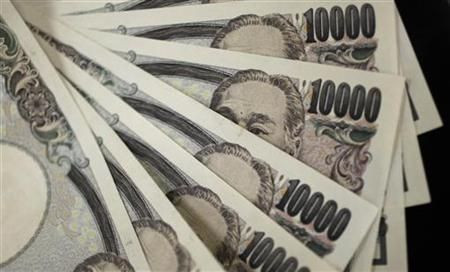Japan’s National Debt Tops 1 Quadrillion Yen (That’s 15 Zeros)

Japan’s national debt exceeded 1 quadrillion yen ($10.46 trillion) for the first time ever in the second quarter, official data showed Friday, underscoring the case for Prime Minister Shinzo Abe to proceed with a sales-tax increase to shore up government finances.
The world’s third-largest economy has increased borrowing this year to spend more on the its infrastructure as part of an ambitious plan to jump start the economy and end decades of stagnation.
The central government’s outstanding liabilities totaled 1.009 quadrillion yen at the end of June, up 1.7 percent from three months ago, the finance ministry said on Friday. That’s larger than the economies of Germany, France and the U.K. combined. The lion’s share of that debt is from long- and short-term Japanese government bonds, as well as other borrowing.
Today, Japan’s gross public debt is by far the highest among advanced economies, standing close to 240 percent of GDP.
“Without a boost to revenues, things will only get worse given ballooning social costs in years to come, driven by a rapidly aging population,” HSBC economist Frederic Neumann warned. Last June, the previous government pushed through a law stipulating that the consumption tax will be hiked to 8 percent in April of next year and, once more, to 10 percent in October 2015.
The International Monetary Fund said last week that the hike was an "essential first step" to fix Japan's fiscal problems, and should not be delayed. "The absence of credible fiscal and structural reforms could weigh on confidence and undermine the success of the started reforms. This would not only be detrimental to Japan, but also for the rest of the world," the IMF said.
The IMF's report estimated that if the sales tax were not increased, Japan's net public debt would rise to around 245 percent of GDP by 2030, compared with 210 percent if the tax hike was implemented as scheduled.
The tax hike, however, is a double-edged sword. It would help raise revenue and prove that Japan is committed to fiscal reform, but the measure would also become a drag on the economy.
According to press reports, the Japanese government has asked for an evaluation of alternative options to the planned tax increase. The government has repeatedly said the crucial data on which it will base the decision is the second-quarter GDP. The first GDP estimate will be published on Aug. 12. Abe said he would make a final call on the plan after the release of revised second-quarter gross domestic product data on Sept. 9.
© Copyright IBTimes 2024. All rights reserved.






















